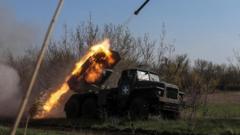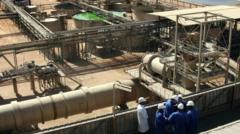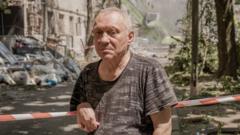European allies, led by Germany, have committed €21bn in military aid to Ukraine, emphasizing air defense capabilities and artillery to bolster Kyiv's defense initiatives.**
European Nations Unite to Bolster Ukraine's Defence with €21bn Military Aid Package**

European Nations Unite to Bolster Ukraine's Defence with €21bn Military Aid Package**
Nations reinforce support for Ukraine amidst ongoing conflict, signaling a unified stance against Russia.**
European defense ministers have collectively announced a significant military aid package totaling €21bn ($24bn; £18bn) aimed at supporting Ukraine during what has been labeled a "critical year" in the ongoing conflict. A substantial portion of this aid, amounting to €11bn over the next four years, is provided by Germany, with British Defence Minister John Healey characterizing the pledges as a formidable message to Moscow.
The commitment was made during a gathering of the Ukraine Defence Contact Group at NATO headquarters in Brussels, where European representatives also discussed providing air defense systems, missiles, and other military gear to fill the logistical gaps left by shifting US defense priorities under former President Donald Trump.
Despite Trump's public offer of a ceasefire, European officials indicated that there were no signs pointing to the war's resolution. The latest support also includes a £450m ($590m) commitment from the UK and Norway, intended for various military supplies, including radar systems and drones, all part of an earlier £4.5bn British commitment.
Air defense initiatives have emerged as a pressing need, with Healey noting that Russian forces had dropped a staggering 10,000 glide bombs on Ukraine during the first quarter of the year, making drones responsible for a significant percentage of battlefield casualties.
Germany's contribution features artillery as a key focus, with plans to dispatch 100,000 artillery rounds, infantry fighting vehicles, battle tanks, and advanced air defense systems. German Defence Minister Boris Pistorius emphasized that a robust military force is crucial for Ukraine to negotiate a just peace.
50 nations were represented at the UDCG meeting, with US Defence Secretary Pete Hegseth attending remotely, reinforcing America's commitment despite prior statements regarding scheduling conflicts.
Ukrainian officials echoed the importance of continued European support, with Defence Minister Rustem Umerov expressing gratitude for the leadership shown in security assistance. Both Healey and Pistorius criticized Russia for its reluctance to engage in peace talks, highlighting an ongoing impasse and indicating the urgency for further diplomacy, evidenced by US special envoy Steve Witkoff's visit to Russia.
On the battlefield, reports indicated that Russian forces had claimed control over the village of Zhuravka in Ukraine's Sumy region, though Ukrainian officials have yet to provide confirmation. President Zelensky remarked that a significant concentration of Russian troops remained poised at the border, anticipating further escalation.





















